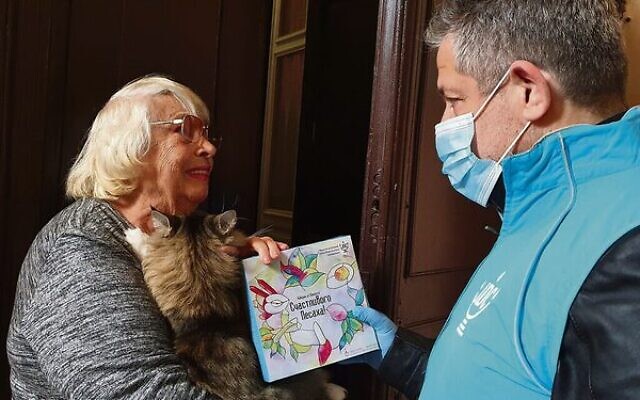Despite danger, Ukrainian Jews celebrate with public seders
"When you have fled a war, sometimes being separated from family, leaving behind everything, that's when you'll start looking for the things that connect you and tie you down."

Between air raid sirens in Odesa, Svetlana Niselevitch, an 84-year-old Ukrainian Jewish Holocaust survivor, prepared to join a Passover seder for the first time in her life.
“We didn’t observe Jewish traditions in my family,” said Niselevitch, a poet who was born in Kharkiv. But she said Russia’s invasion of Ukraine, as well as the COVID-19 pandemic, convinced her that “every chance to practise Jewishness is important”.
Niselevitch, who planned to celebrate at an event organised by the Joint Distribution Committee, or JDC, was among thousands of Ukrainian Jews preparing to attend dozens of group seders both within Ukraine and outside it as refugees from Russia’s war.
The numbers demonstrate both the robustness of the worldwide relief effort supporting Ukrainian Jews, and Judaism’s ongoing resilience in a region scarred by the Holocaust and communist suppression of religion.
For the Jews who remain inside Ukraine, wanting to participate in large gatherings in such circumstances may seem counterintuitive, considering that the pandemic is still raging across Eastern Europe.
“But it’s only natural,” said Gershon Birenboim, a Jewish teacher preparing a group seder in Irshava, western Ukraine, for refugees from Odesa, Kharkiv, Kyiv and beyond.
“When you have fled a war, sometimes being separated from family, leaving behind everything, that’s when you’ll start looking for the things that connect you and tie you down.”
At least 20 cities in Ukraine had group seders run by Chabad, similar to normal years, according to Motti Seligson, the Chabad-Lubavitch movement’s director of media relations.
Chabad alone collected at least 20 tons of matzah in Ukraine despite border closures, customs delays and other supply chain failures connected to Russia’s invasion.
There are other complications. Part of the tradition of Passover is to discuss the story of the Jewish exodus from Egypt late into the night, but most of the country’s cities have emergency curfews in place.
Some seders, including one for 300 guests in Kyiv, were being held at hotels where the seder participants could sleep over.
For people unable or afraid to attend in-person seders, the JDC set up a virtual online seder.
Rabbi Zushe Abelsky, the director of Chabad in Moldova, where hundreds of thousands of Ukrainians have fled, said demand for seders in Chisinau, Moldova’s capital, was so high that he and his staff had to open the Central Synagogue of Chisinau even though it is currently closed for renovations.
Chabad of Moldova, which usually stocks up on matzah and other Passover supplies months in advance, received them the week of the festival.
“We were hunting for matzah, every piece we could get,” Abelsky said. Part of the problem was that Moldova’s Jewish community relies on Ukraine’s for such supplies. They had to be imported from Israel and Hungary this year, with help from the International Fellowship of Christians and Jews.
In addition to Moldova, Poland, Hungary and Romania are among the East European countries where Jewish communities organised public seders for refugees, complete with Russian-language haggadahs containing the seder text.
The thousands of Jewish arrivals to Western Europe, and especially Germany and Austria, also had seders especially designed for them.
And in Israel, where thousands of Ukrainians and Russians have moved because of the war, the Jewish Agency, Chabad and individual municipalities, such as Nof Hagalil, also gave public seders for refugees, mostly at the hotels where they are being housed.
In Chisinau, Abelsky, a 55-year-old who has four children with his wife Chayah, said, “The Israelites began fleeing Egypt under the cover of darkness, at night. But then the sun rose and a miracle happened.”
He was referring to the story of the parting of the Red Sea for the fleeing Israelites and added, “The same will happen for our refugees: It’s the middle of the night for them now but soon the sun will rise and a path to safety will present itself. They will rebuild a life better than the ones they left behind.”
JTA

comments